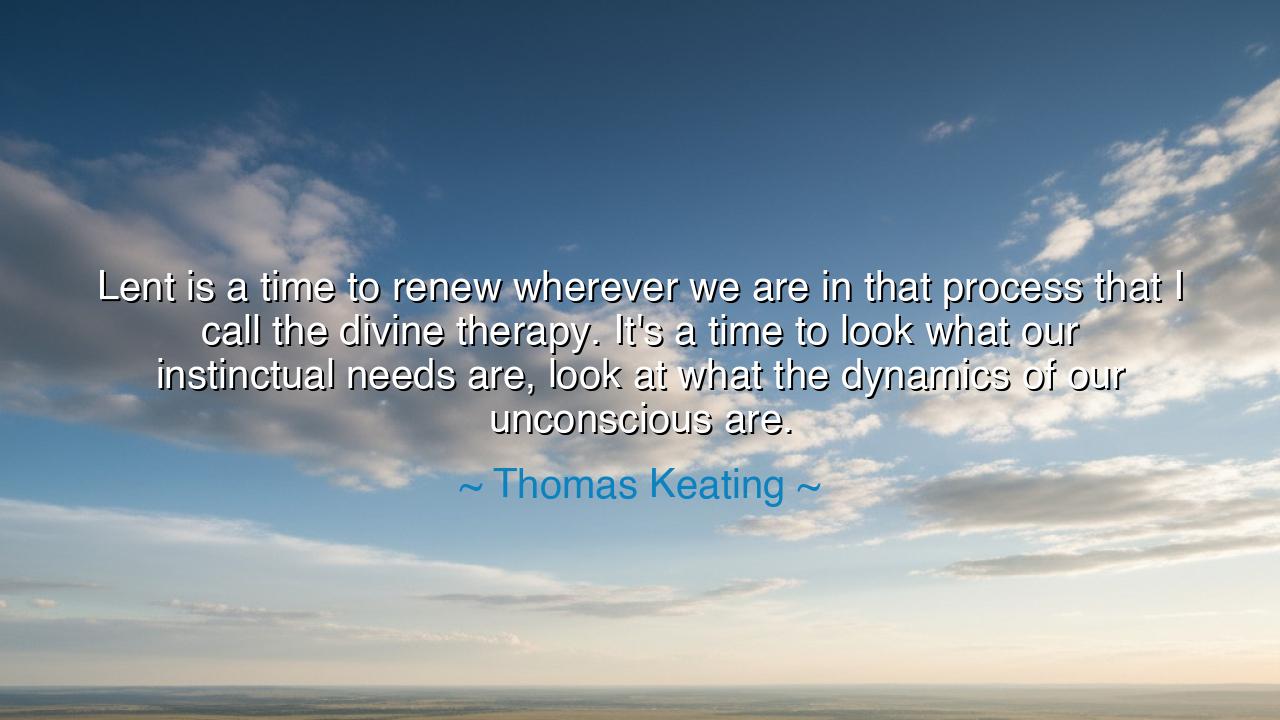
Lent is a time to renew wherever we are in that process that I
Lent is a time to renew wherever we are in that process that I call the divine therapy. It's a time to look what our instinctual needs are, look at what the dynamics of our unconscious are.






Thomas Keating, the monk of silence and teacher of contemplative prayer, once declared with holy depth: “Lent is a time to renew wherever we are in that process that I call the divine therapy. It's a time to look what our instinctual needs are, look at what the dynamics of our unconscious are.” These words rise like incense from the heart of Christian tradition, yet they speak a truth that touches all people who seek healing of the soul. For Keating reminds us that Lent is not merely ritual fasting, nor outward sacrifice, but an inward journey—a season when the human heart is drawn into the furnace of purification, where its wounds are seen, its hungers examined, and its spirit restored.
The origin of this saying rests in Keating’s lifelong work with contemplative prayer. He called this inner work the divine therapy, for in silence and reflection, God Himself becomes the physician of the human soul. In Lent, through prayer, fasting, and examination, men and women are invited to let go of their masks, to cease running from themselves, and to face the raw truth of their needs and their unconscious fears. This is not meant for despair, but for healing—because what is brought into the light can be redeemed.
When Keating speaks of instinctual needs, he points to the primal hungers that drive us: the need for security, for affection, for power. These are not evil in themselves, but they are dangerous when left unchecked, when hidden in the depths of the unconscious, festering and controlling us without our awareness. Lent, in his teaching, is the time to bring these into the open, to recognize where they distort our choices, to surrender them to God in honesty. In this way, the fast becomes more than abstinence from food—it becomes a fast from illusion.
History has given us many mirrors of this wisdom. Think of Saint Augustine, who confessed in his Confessions that before his conversion he was enslaved by desires he did not fully understand. His greatness was not in hiding them, but in facing them with courage, naming them before God, and allowing grace to transform them. Augustine’s journey was a form of divine therapy, centuries before Keating gave it that name. His renewal was born not of denial of his struggles, but of his willingness to examine the deep movements of his unconscious.
This wisdom also echoes beyond religion. In the practices of ancient philosophers, such as the Stoics, self-examination was considered the key to freedom. Epictetus and Marcus Aurelius urged men to study their own minds daily, to test their desires, to strip away illusions. Keating’s call during Lent is much the same, though clothed in the language of prayer: that by uncovering our hidden drives, we may no longer be ruled by them. The divine therapy is not only medicine for the soul but liberation for the spirit.
The lesson, then, is clear: renewal requires honesty. You cannot be healed of what you refuse to see. If your life is guided by fears buried deep within, or desires unexamined, you will remain enslaved. But if you dare, during the sacred season of reflection, to bring them into the open—to fast from self-deception, to pray with humility, to sit in silence until the truth emerges—then your spirit will grow strong, your heart will be healed, and you will walk in freedom.
Practically, this means setting aside time for silence and self-reflection. During Lent—or in any season of the soul—ask yourself: What hungers drive me? What fears control me? What wounds remain hidden within me? Write them, name them, bring them to God or to the quiet space of the heart. Then, with patience, allow the divine therapy to do its work, layer by layer, season by season. Renewal is not achieved in a single day, but in the steady practice of honesty and surrender.
So let Thomas Keating’s words echo like a bell calling us to prayer: “Lent is a time to renew… a time to look at what the dynamics of our unconscious are.” Do not fear this call. For to face the truth of yourself is not destruction, but healing. And to walk this path is to discover that the Divine Physician, who knows the depths of the human heart, has always been waiting there, ready to restore you to wholeness.






AAdministratorAdministrator
Welcome, honored guests. Please leave a comment, we will respond soon